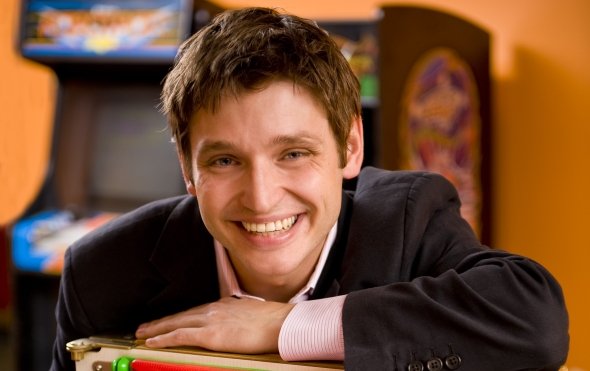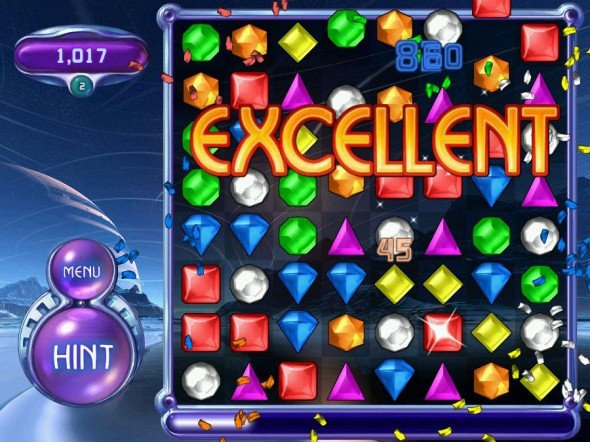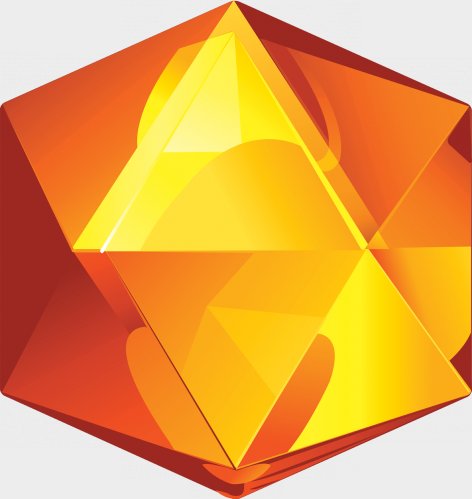Interview: John Vechey on founding PopCap, making Bejeweled

PopCap Games are the creators of Bejeweled, Peggle and Plants vs. Zombies, each of them one of the biggest and most lovable games on PC. When casual and social games are reaching ever larger audiences and their developers are getting a bad reputation for poor design practices, how have PopCap managed to find fans amongst gamers and grannies alike? To find out, I visited the studio and interviewed everyone I could find. We're running those interviews each day this week and calling it PopCap Week .
We begin with John Vechey. As one of PopCap's three co-founders, he's been with the company since the beginning and instrumental in growing the studio from three friends working from home, to a massive operation with hundreds of people. He also played a key role in developing the studios biggest game, Bejeweled. I spoke to him about when PopCap was originally named Sexy Action Cool, what he thinks Activision and EA are screwing up, and about where the idea for Bejeweled came from.
PC Gamer: To start at the beginning, how did you get into game development?
John Vechey: Well Brian Fiete and I, one of the co-founders, met in college. So I never had a computer growing up and I remember my friend had got a computer. I went over to his house and it was AOL, the internet. I was like “holy cow”, I had no idea what it was, and my first thought was, “Man, I want to play games”, and this was a time of Tempest, not Tempest. What was that game where you could rotate in any direction? It was like a first person shooter but you had no – it might have been set in space or underwater.
PC Gamer: Was it Descent?
John Vechey: Descent! Yeah, Descent. I was like, “Woah, I want to play against people!” and he said, “It's much harder than you think,” and so then I personally thought “that's a bummer” because what's the point in connecting things unless you can play games? But other than that I had an Atari and Nintendo growing up, I never had a computer, and then at college my dad got me a computer. He actually got me – he cosigned for a loan for me to get one, which was almost like him getting me one! And I met Brian Fiete in class and then we were both programming, he was a good programmer and I was a bad one, and I said, "Let's make a game."
So we made this internet only action game called Ark, and we ended up putting that live on the internet and we had rented a server and everything. Jason, the third co-founder was working for Total Entertainment Network which became Pogo. He saw the game online and was like, "Hey that's a pretty cool game, let's chat.” They ended up licensing the game for us, and then my Aunt's friend's parents were next-door neighbours with Ken and Roberta Williams, the founders of Sierra. Through that connection Ken called us up and was just like, "This is kind of cool what you guys have done, you've made this game, that's sweet, the internet is going to be big for games, let's chat,” and we got hired to go work for their internet division when we finished college, which I thought was cool because I was totally failing out. So it really worked for me, frankly!
The biggest gaming news, reviews and hardware deals
Keep up to date with the most important stories and the best deals, as picked by the PC Gamer team.

PC Gamer: How did you get on at Sierra?
John Vechey: We were in the internet division, WON.net, and it was a really a pretty bad division in that it didn't know what it was trying to do. Was it trying to do games technology and support the next CD ROM titles, or was it trying to make internet games? In fact, Brian Fiete and the programmer of Peggle didn't go to a game developers conference one year and so they spent a week and made this little boardgame called War Dogs. They actually got in trouble for making War Dogs, right? Then the company launched it anyway and it did phenomenally well and they had to backpedal and be like, "Oh no, we're glad you made it now!" But it really didn't know what it was trying to do.
We lasted about 2, 2 and a half years. I worked on some game technologies that let you swap skin and map files for Half Life, Starsiege Tribes and a bunch of games at the time, so I ended up getting a lot of sales experience by talking to these game developers who had a need to put this extra technology into their games to make it easier for users to download and install them, because at the time you had to download the zip file, you had to know the directory structure, it was kind of a pain, and we were trying to make it easy. But after 2 and a half years at Sierra we decided, let's start up a game company making simple games in your internet browser.
PC Gamer: What prompted the decision to leave Sierra?
John Vechey: Brian and I had always talked about starting a company together, but we wanted some more professional experience. We'd kept in touch with Jason and maintained a friendship and I talked with him on a lot of different things. We'd done some prototypes on the side, we had this, like, we called it Junk Tank. It was this first person, or third person shooting tank game that we'd done that Brian and I had worked on.
So we had done a fair amount of little things and were always thinking about eventually starting something and, for us what it came down to was: web browser games are things you can do with three people. We had all the talents needed to make a business out of that. Jason could do the art, the production and a lot of the game design, Brian was a great programmer, I would do the business side and be dead weight for our initial couple of games, and we just decided to make the company.
PC Gamer: Was always the plan to set out on your own?
John Vechey: Yeah, Brian and I often talked about it. When we were working for Sierra we were like, "We could probably make more doing our own thing but hey, it gets us out of Indiana.” I don't know if you've ever been to Indiana?
PC Gamer: No.
John Vechey: It's like a shithole, but shitholes are nicer.

PC Gamer: PopCap's first big success was Bejeweled. How did development on that begin?
John Vechey: I'd seen a game that used some similar rulesets to Bejewelled, but there was no animation, no sound effects, and they were very indifferent rules. We simplified it and changed it and then I sent a link out, then Brian did a version that was just circles and then Jason added the gem graphics. So it was three days of boom, boom, boom, and then we had it.
We knew how to make browser games because Jason was doing that at Pogo and felt that they were spending too much money and weren't making very good games because they were very structure oriented. In fact, Pogo to this day still has, a game designer can do a prototype, but once they get a prototype then they have to write a design doc that has every element and game design choice already made, and then a programmer programs it, and then the artist does the art. Jason was like, it's not the best way to make games. It's expensive and making some okay games, some pretty good games, but nothing spectacular. Our goal was to say, "Hey, we're going to make these simple games and make them really awesome, and spend a lot of time and make a very iterative process."
PC Gamer: How long did you spend making the game before it first launched?
John Vechey: We spent about a month making the game and then we started showing it to companies. We were trying to sell it outright, so we tried to sell it to EA for $60,000 dollars, and they said no, thank goodness! And then we showed it to Microsoft and tried to sell it for $30,000 and they said no. But they said they would do a licensing fee for $1500 dollars a month. We had two games at the time, we had Bejewelled and our second game, Alchemy. So, okay, $1500 a month times two is $3000 a month. If we get about ten of these we're actually okay, right? And our third game we licensed exclusively for ten grand a month, so we ended up not being a great business, but for three guys it was working out okay.
Then Bejewelled experienced disproportionate success to any money we were making. I think it was getting 50/60 thousand peak users during the day. I don't know what that is in monthly users, or daily users, but a lot of people were playing it, yet it took a while for us to find the financial success behind that.
PC Gamer: MSN the first place it appeared?
John Vechey: I think it appeared on Sexy Action Cool, which was our company name at the time. We always thought we were just going to do licensing and didn't think we were actually going to be a consumer brand, so we put the games up, Bejewelled and Alchemy, and were like, "At some point we should get a better name”. So that's how we actually solved it. We had PopCap, and PopCap.com, as more consumer facing brands, instead of Sexy Action Cool.

PC Gamer: How did the company start to grow? You're being licensed, you're making some money, there's three of you. At that point, did you have an office?
John Vechey: We didn't have an office, we were just working from our apartments. That was probably, it was about a year and we were barely getting by. I had to borrow some money from some friends who never thought they were going to get the money back, so I have good friends, and we started making around 15 thousand/17 thousand a month, so it was here and there, a couple of deals.
Then, in 2001 we created a downloadable version [of Bejeweled]. A lot of people at the time were connecting using modems, and people wanted to play it offline so they didn't have to take up their phone line. We created a downloadable version that people could download and play for an hour trial, then if they liked it they could pay $20 for it. Now we're making like, 30/40 grand a month just from that one downloadable version on our website. Brian and I moved to Argentina for a couple of months. I was working there when I got Yahoo to do downloadable games and then...
PC Gamer: Why did you move to Argentina!?
[Continue to page two to find out why they moved to Argentina!]

